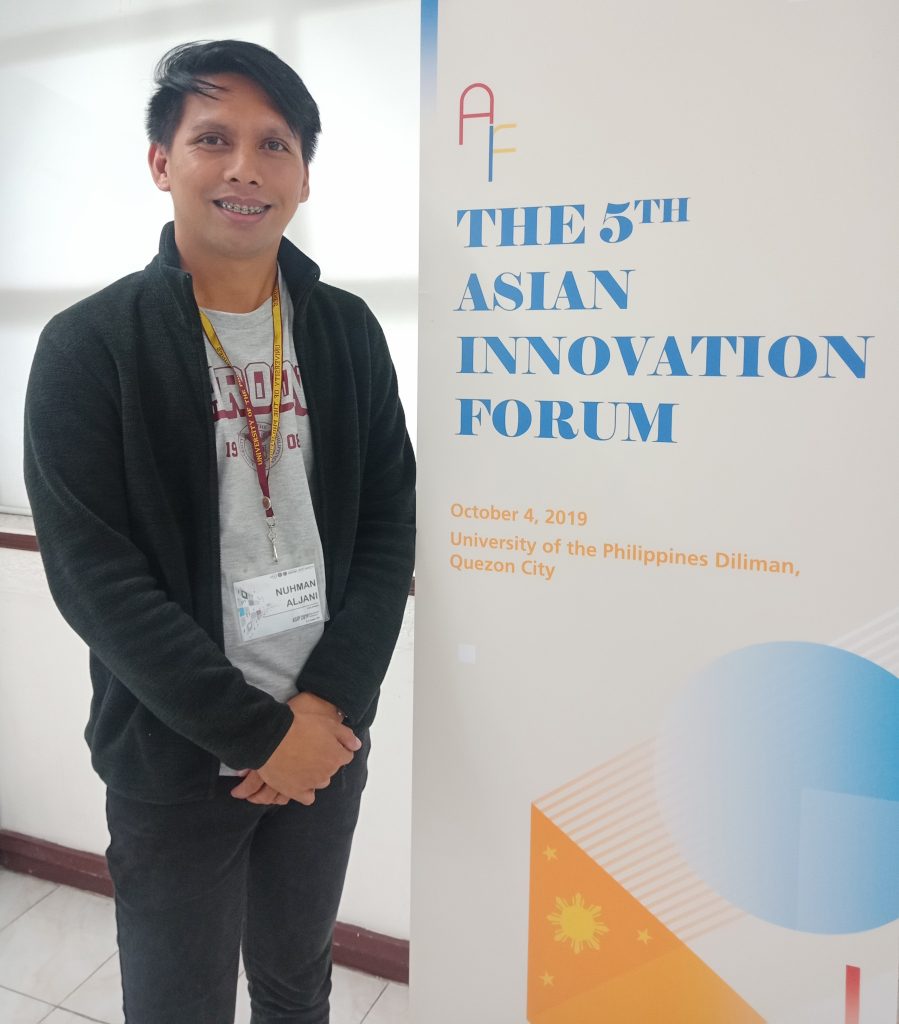UP ISSI recently hosted the ASIP 2019 International Conference last 3-5 October with the theme “Technology and Innovation for SMEs.” Various foreign voices and international concepts abound during the conference, especially with a culturally diverse line up of paper presenters and workshop moderators. Amidst all these, we sat down with a Filipino participant and listened to his voice. We learned anew when we heard from Mr. Nuhman M. Aljani, a Science Research Specialist from the Department of Science and Technology (DOST) and concurrently a graduate student at the UP Technology Management Center. We hope attendees, and even those who were not able to attend the Conference, will get to benefit as well from these pockets of knowledge from Mr. Aljani:
- Collaboration: The “triple helix” composed of the Industry-Academe-Government is an evident driving force towards promoting research and development in our neighbor countries. Mr. Aljani reasoned that Malaysia’s government spending on R&D is 5 times greater than the Philippines. In addition to funding support, he suggested that legislative backing would also be helpful to institute in our country. Policy makers could refocus allocations for R&D, outputs of which may in turn be utilized by the private industry.
- Prioritization: In light of limited funds, Mr. Aljani suggested calibration to see if resources are sufficient to support R&D. In terms of researches about technologies, prioritize appropriate and mature ones ready for implementation. He mentioned the Pareto Principle, and asserts that for efforts to be significant and relevant, actions should target the vital few that would bring about the most improvement in the industry.
- Commercialization: The private industry would only benefit from R&D if the outputs would be packaged in a form that could be utilized by end users. Mr. Aljani stressed the importance of commercialization: Researches should be out there in the market, not kept on the shelves.
- Synchronization: “R&D initiatives, though well meaning, tended to be unsynchronized as each agency has similar but separate projects towards the same direction,” observed Mr. Aljani. He cited his hometown to provide an example, and said that Region 9, the Zamboanga Peninsula, is rich in seaweed and rubber. DOST has the Small Enterprise Technology Upgrading program helping micro, small, and medium enterprises (MSMEs) in terms of production technologies. The Department of Trade and Industry has the Shared Service Facilities program for MSMEs to have a common-use resource for processing. The academe has researches on technical aspects of commodities. All efforts would bring about more value add to the seaweed and rubber industry if actions are contributory and complementary, and if these are consistent among the 17 administrative regions of the country.
- Appreciation: Mr. Aljani’s most encouraging realization is with regards to the technological maturity of the Philippines. The country’s environment for technology development and innovation is now capable to handle a stronger push. A national policy directed towards strengthening R&D efforts could advance the innovative mindset of our countrymen and bring about more Filipino-made technologies for Filipinos.

Mr. Aljani thus ended the interview on a positive note, one that is forward looking to the continuing internationalization of Filipino researches and researchers.
Disclaimer: The views expressed herein or in any article in the UP ISSI website are those of the authors and do not necessarily reflect the policies or opinions of UP ISSI nor the views of the University of the Philippines. Regarding Accuracy of Information and Usage of Data: Visitors and users of the UP ISSI website are advised that information contained within the website is assumed to be accurate. However, errors can occur even with computer-generated information. UP ISSI makes no representation regarding the completeness, accuracy, or timeliness of such information and data, or that such information and data will be error-free. Visitors are encouraged to review the official version of all documents on which they plan to rely on.
These well-thought insights truly express the importance of Technology and Innovation towards growth and development for our local MSMEs. Kudos, Mr. Aljani!